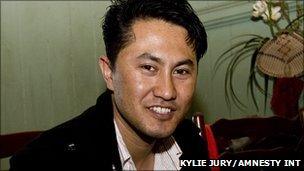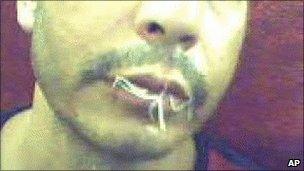Refugee's long road to acceptance
- Published
Chaman Shah Nasiri, an ethnic Hazara, fled Afghanistan in 2001. His family had been persecuted by the Taliban: his father was tortured to death; his elder brother was killed and another kidnapped. He tells the BBC about his long journey from unwanted asylum seeker to Australian citizen.

Chaman Shah Nasiri was detained on Nauru under the "Pacific Solution" between 2001 and 2004
I was 19 years old when my brother was taken by the Taliban, and my family arranged to get me out of the country.
They paid people-smugglers US$4,000 (AU$4,425; £2,500) - they sold our shop and a piece of land and I don't know how much money they borrowed.
Everything was done in secret. I was informed at the last minute, when I was put in a taxi and taken across the border to Pakistan. From there I was flown to Indonesia via a vast network of smugglers. It was very frightening.
I stayed in Indonesia for nearly four months in a room hired by the smugglers far out of town. Our passports were fake so we were not allowed contact with anyone.
Then one night we were taken to a small wooden fishing boat and told we were being sent to Christmas Island, which is owned by Australia. They said it would take 38 hours to get there - it took three days.
There were 222 people crammed onboard, mostly Hazaras from Afghanistan, but also people from Turkey, Sri Lanka and Pakistan.
Families and children were in the hull and single men were on deck. The first day was alright but when night fell a storm hit. There was no roof or sides to shelter us from the 7m waves.
Some of us tied a rope to the mast to hold on to but it slid off and we nearly all fell into the water. It was so dangerous and cold.
People in the hull were vomiting as the smoke from the engine was coming into their faces. We were burned by the sun.
An Australian Navy speedboat intercepted us before we got to Christmas Island and told us to turn back but the captain kept going. We were intercepted again and made to wait on the boat for another three days.
Sleeping pills
From Christmas Island we were sent to Nauru. I was there from December 2001 to July 2004.

In 2003, 45 people went on hunger strike and sewed their lips together
We were kept in what were called long houses, made of aluminium and plastic sheeting. There were about 50 people in each, sleeping in bunks. It was very overcrowded.
It was very hot. People played football and had English lessons but generally there was not a lot to do.
Constantly our thoughts were of our families. In countries like Afghanistan women are not allowed to work and the men - who are the only hope as the breadwinner - are sat in these camps and they can't move forward and they can't go back.
We had immigration interviews but were rejected again and again. This creates a lot of anxiety and depression. There were people trying to commit suicide and cut themselves and relying on sleeping pills.
I was on sleeping pills most of the time - I had no other option. I couldn't stop myself from thinking about my family. Taking the pills was the only thing I could control.
We were basically out of sight, out of mind. Despite repeated attempts, the authorities allowed no media access, no independent doctors, migration agents or lawyers - we had no rights.
In 2003, 45 people went on hunger strike and sewed their lips together. I was their spokesman. At that point, the UNHCR decided to re-interview all the people they were processing and asked the Australian government to do the same.
In a way it brought us a little of hope.
Human instinct
The day my interview was scheduled I'd taken three sleeping pills - but they hadn't worked. When my name was called a friend came to get me but I told him I was not going as it would just be another rejection - I was totally lost and hopeless.
Eventually he convinced me to go. I sat in front of the immigration officer as he read from a piece of paper. The interpreter was translating.
When he finished the sentence that I had been recognised as a genuine refugee I stood up and said 'thank you very much' and I was going to go. The interpreter said I had to stay until he finished - but I said: "What if he changes his mind?"
There had been so many lies and tricks, I could not believe it.
Getting on the plane to leave was really enjoyable in some ways, to leave Nauru and have freedom. I was happy for myself but constantly thinking of those who were left behind. It was a hard situation.
I have been in Australia six years and am working as a welder. In May I became an Australian citizen.
This is the first time I will be able to vote in an election. I won't be voting for Julia Gillard or Tony Abbott.
As a former detainee, I would never support any policy to detain people for no reason or long-term - no matter if it is Nauru or East Timor or elsewhere. People are being used for politics.
Refugees, "queue-jumpers", "boat people", illegal whatever… All refugees are human beings, they do have hearts, they do get hurt.
It is a basic human instinct to flee danger. It's a struggle for survival - that's what these refugees are doing.
I wish I'd been born in Australia but this was out of my hands.
- Published19 August 2010
- Published15 December 2010